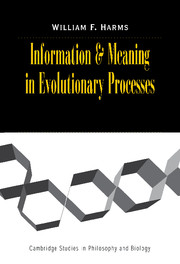Book contents
- Frontmatter
- Contents
- Acknowledgments
- Introduction
- PART I GENERALIZING EVOLUTIONARY THEORY
- PART II MODELING INFORMATION FLOW IN EVOLUTIONARY PROCESSES
- 3 Population Dynamics
- 4 Information Theory
- 5 Selection as an Information-Transfer Process
- 6 Multilevel Information Transfer
- 7 Information in Internal States
- PART III MEANING CONVENTIONS AND NORMATIVITY
- Epilogue: Paley's Watch and Other Stories
- Notes
- Appendix: Proof of Information Gain under Frequency-Independent Discrete Replicator Dynamics for Population of n Types
- References
- Index
3 - Population Dynamics
Published online by Cambridge University Press: 28 July 2009
- Frontmatter
- Contents
- Acknowledgments
- Introduction
- PART I GENERALIZING EVOLUTIONARY THEORY
- PART II MODELING INFORMATION FLOW IN EVOLUTIONARY PROCESSES
- 3 Population Dynamics
- 4 Information Theory
- 5 Selection as an Information-Transfer Process
- 6 Multilevel Information Transfer
- 7 Information in Internal States
- PART III MEANING CONVENTIONS AND NORMATIVITY
- Epilogue: Paley's Watch and Other Stories
- Notes
- Appendix: Proof of Information Gain under Frequency-Independent Discrete Replicator Dynamics for Population of n Types
- References
- Index
Summary
SIMPLE SELECTION
Introductions to evolutionary theory commonly explain the concept of natural selection with examples like this: Walking along a rocky beach, you cast your eye down the shoreline and you notice that pebbles of different sizes, instead of being scattered at random about the beach by the crashing waves, are neatly arranged in bands according to size. This orderly arrangement, although it looks almost like the work of an intelligent mind (or at least a meticulous and industrious mind), is in fact the result of certain simple physical processes. Why each size finds itself stable in each range is, of course, a rather complicated affair, but why it is that similar pebbles are grouped together is not. Details aside, the basic principle is this: different sizes of pebbles have stable positions at different distances up the beach, and as each pebble lands in a range where it is stable, it tends to settle there. If it lands in a range where it is not stable, it is easily dislodged. Over time, this has an ordering effect, and although individual pebbles may be moved out of their particular “stability zone”, the cumulative effect of the differential tendency of pebbles of different sizes to stay in different locations overwhelms the short-term chaos of crashing waves.
The universe, we are informed, is populated by locally stable arrangements and things. Things and arrangements that are locally unstable tend not to be much in evidence.
- Type
- Chapter
- Information
- Information and Meaning in Evolutionary Processes , pp. 81 - 108Publisher: Cambridge University PressPrint publication year: 2004



